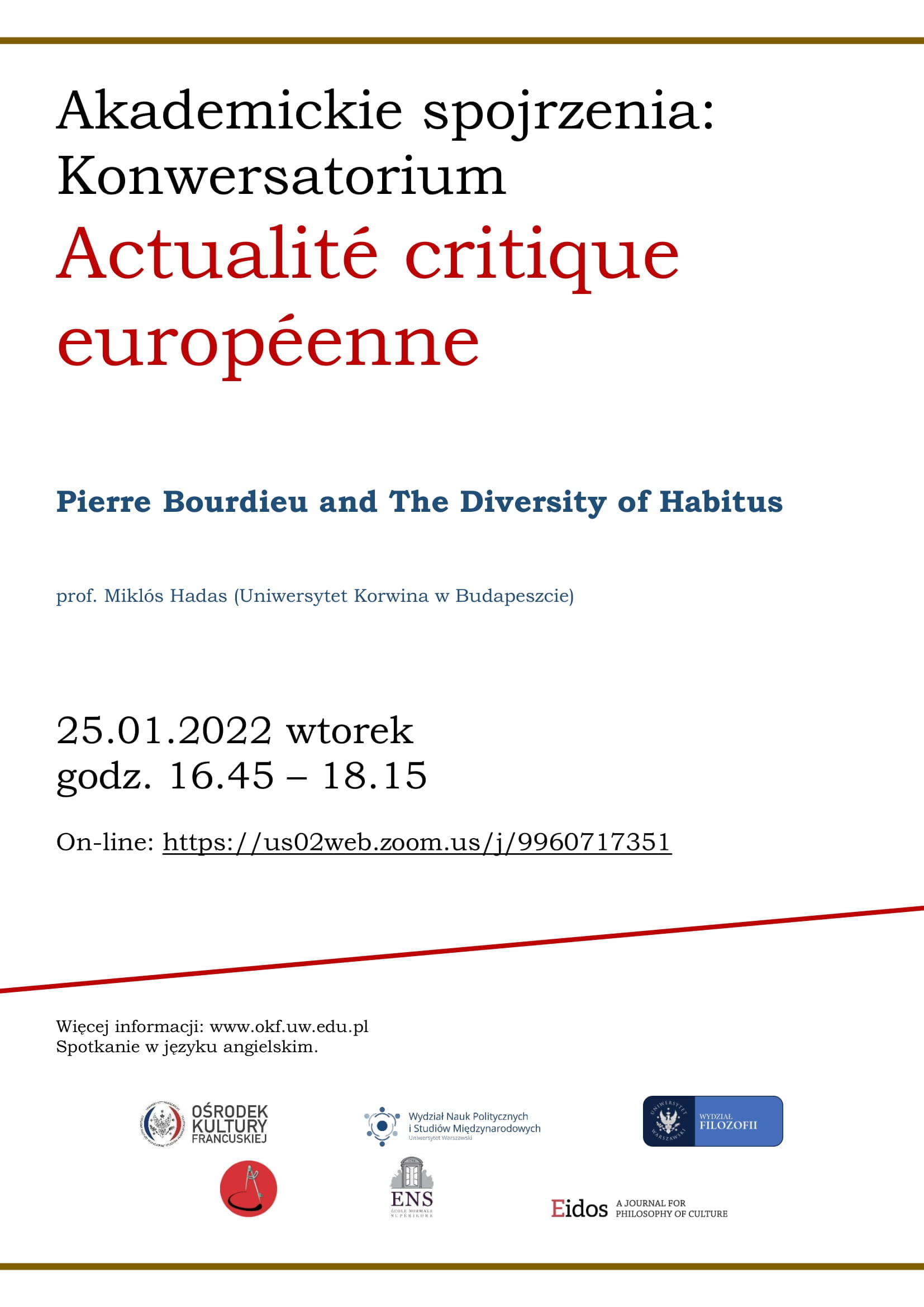Le séminaire Actualité critique européenne

Open lecture “New dimension of diplomacy in the era of globalization”
January 18, 2022
Seminar: Europe, China, US, international institutions and globalization: different perspectives or just a game role?
January 24, 2022
Le séminaire Actualité critique européenne 25/01/2022
Le Centre de civilisation française et d’études francophones de l’Université de Varsovie, la Faculté de sciences politiques et d’études internationales de l’Université de Varsovie ainsi que la Faculté de philosophie de l’Université de Varsovie en coopération avec l’École Normale Supérieure rue d’Ulm vous invitent à la rencontre dans le cadre du séminaire d’Actualité critique européenne.
Pierre Bourdieu and The Diversity of Habitus
prof. Miklós Hadas (Université Corvinus de Budapest)
le mardi 25/01/2022, 16h45-18h15
La rencontre, en anglais, se tiendra en ligne : https://us02web.zoom.us/j/9960717351
Veuillez noter que la réunion est enregistrée. L’enregistrement sera utilisé à des fins scientifiques. La participation à la rencontre équivaut à donner son consentement.
Plus d’informations : www.okf.uw.edu.pl
Abstract:
The Bourdieusian concept of habitus denotes a system of durable and transposable dispositions which, integrating all past experiences, functions at every moment as a matrix of perceptions, appreciations, and actions, and makes it possible to accomplish infinitely differentiated tasks. The great French sociologist applies four conceptual strategies to capture the relations between changing social structures and dispositions. His first strategy is ignorance: In Distinction he theorises about the change in the social structure but does not link this discussion to changes in habitus. According to the second conceptual strategy (which he develops in Masculine Domination), institutions change, but dispositions remain unchanged. This is the “permanence in change” model. His third strategy is to address the relation between structure and habitus. This is realised through the concepts of hysteresis or the Don Quixote effect. These terms refer to crisis situations where patterns of normal functioning have become dysfunctional because of a lack of consistency between the inherited habitus and the altered constraints and expectations during and after a social transformation. The fourth conceptual strategy is to introduce new terms – such as “primary”, “secondary”, or “cleft habitus” – to identify diverse dispositional patterns. Building on my latest book, I propose that as social structures change, habitus change correspondingly. I intend to offer examples of habitus pluralisation, arguing that this modification of Bourdieu’s thought renders it more suitable for the study of social changes and represents the development of a path that Bourdieu himself had begun to explore in the later stages of his career.
Bio:
Miklós Hadas, a student of Pierre Bourdieu, is professor of sociology, former head of the Culture and Communication Doctoral School and founder and co-director of the Centre for Gender and Culture at Corvinus University of Budapest, Hungary. He is also member of the sociological committee of the Hungarian Academy of Sciences. From 1990-2002 he was the founding editor-in-chief of Replika, a leading Hungarian journal of social sciences. Actually, he is member of the advisory board of NORMA (International Journal for Masculinity Studies). He is author of numerous articles on gender and masculinity and of A modern férfi születése (The Birth of Modern Man, 2003). This book was awarded the Polanyi Prize by the Hungarian Sociological Association for the best sociological book to be published that year. His articles have appeared in journals such as The Anthropological Forum, Actes de la recherce des sciences sociales, The Journal of Social History, History of Education, The American Sociologist, International Journal of the History of Sport, Sports Historian, Masculinity and Social Change, Historical Sociology, Historical Social Research. His latest book on Pierre Bourdieu was published recently: https://www.routledge.com/Outlines-of-a-Theory-of-Plural-Habitus-Bourdieu-Revisited/Hadas/p/book/9781032017051






